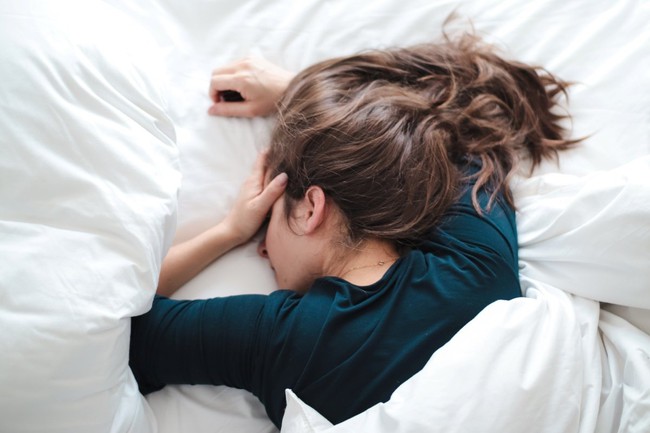Causes of jaw pain when waking up
Feeling jaw pain after waking up in the morning is a condition many people suffer from. The pain can make it difficult to yawn, talk, chew, and even interfere with everyday tasks. Here is a summary of some of the causes of jaw pain after waking up and expert advice:
Jaw pain after waking up due to teeth grinding while sleeping

Teeth grinding can happen unconsciously and often occurs at night.
Teeth grinding is one of the most common reasons for a sore jaw after waking up. This phenomenon often occurs at night and is an unconscious habit many people have.
Craig Ratner, a dentist and former president of the New York Dental Association, says grinding your teeth is like a habit of turning around when you sleep, so you may not know you are doing this until you feel pain.
The most common cause of teeth grinding during sleep is a jaw problem. The brain wants the teeth, jaw, and all the muscles around the head and neck to be in the most comfortable position when sleeping, explains Dr. Craig. So, if it feels uncomfortable, the body will move its jaw on its own to try to avoid the discomfort.
In addition to jaw pain and muscle fatigue, other signs that you’re grinding your teeth while you sleep include chipped teeth, loose teeth, worn enamel, increased tooth sensitivity, headaches or facial pain, and a dull ache in your jaw. and has temporomandibular joint (TMJ) disorder.
Although this unconscious habit cannot be prevented, people can still take steps to protect their teeth and avoid pain.
According to dentist Craig, an anti-bruxism tray is a commonly used tool to limit the unconscious rubbing of two jaws.
However, if grinding is severe and the pain is persistent or very severe, you should see a medical professional as soon as possible. Dentist Craig has shown, they can use the device to help correct jaw position. Thereby reducing pressure on teeth and muscles.
Also, level control stress are equally important as they can aggravate unconscious teeth grinding.
Jaw pain after waking up due to bad sleeping position

Sleeping in a bad position can cause the jaw and its related muscles to be stretched, leading to jaw pain after waking up.
According to dentist Craig, sleeping in the wrong position throws off the balance of the muscles that support the head and neck. These muscles greatly affect the position and function of the jaw. Therefore, people can easily find that sleeping in a bad position often causes pain after waking up.
While there’s currently no sleeping position that helps prevent jaw pain, there are things you can do to make sure your head and neck are positioned in the most comfortable position to sleep. As Dentist Craig pointed out, using the right pillow is important because lying on your side combined with a head that isn’t in a good position can easily lead to muscle strain.
Exercise habits

Weightlifting and vigorous exercise such as running can strain the jaw muscles.
Your daily exercise routine can also be the reason why you feel aching jaw after waking up. According to dentist Craig, some people have a habit of grinding their teeth while performing high-intensity exercises that require vigorous movement and this can easily lead to jaw strain. In addition, overtraining also contributes to the worsening of muscle pain.
To fix it, you can use an anti-bruxism tray or visit your dentist to buy a device to help protect your teeth. Dentist Craig advises, be careful with these instruments as they can sometimes put the jaw in a painful position.
Sleep apnea

Jaw pain in the morning can be caused by sleep apnea, a sleep disorder that affects breathing while sleeping.
Many people with sleep apnea complain of chronic jaw pain, says Dr. Craig. This is because the position of the jaw is related to this sleep problem.
Several studies have shown that the brain does everything to keep the airways open, including grinding teeth, forcing the jaw muscles to move into a position that doesn’t obstruct the airway.
In addition to jaw pain, other symptoms of sleep apnea include, loud snoring, gasping while sleeping, headaches in the morning, feeling dry mouth after waking up, trouble sleeping or insomnia, excessive sleepiness. daytime sleepiness, difficulty paying attention when awake, and irritability.
If you are suspecting you have sleep apnea, see a sleep specialist to get an accurate diagnosis. People with this condition can use a number of devices to help correct the position of the jaw and make the airway unobstructed.
Food containing stimulants

Certain foods and drinks can stress the body and contribute to jaw pain if consumed right before bed.
According to dentist Craig, foods contain stimulants like caffeine, which can affect the brain and cause stress. Thereby contributing to aggravation of teeth grinding at night. Alcohol and other substances also contribute to this. The Mayo Institute explains that alcohol relaxes the muscles in the back of the neck, which can interfere with breathing.
Therefore, people should avoid consuming these foods and drinks before sleeping. Cut down on caffeine, limit alcohol consumption a few hours before bed, and help prevent discomfort after waking up and ensure quality sleep.
Temporomandibular joint disorder (TMJ)
Jaw pain in the morning is often a warning sign of a temporomandibular joint disorder. According to dentist Craig, 1 in 12 people have TMJ. Sometimes other factors such as poor posture, missing teeth, teeth that are misaligned or misaligned also contribute to this condition.
In addition to jaw pain and facial pain, people with TMJ also experience a number of other problems such as headaches, neck pain, ear and sinus congestion, and dizziness. If you suspect you have TMJ, see a specialist for advice. Dentist Craig has shown, your doctor can help you with this condition, from using a mouth guard, managing stress to performing orthodontic treatment of the jaw.
(Source: Livestrong)
at Blogtuan.info – Source: Afamily.vn – Read the original article here



